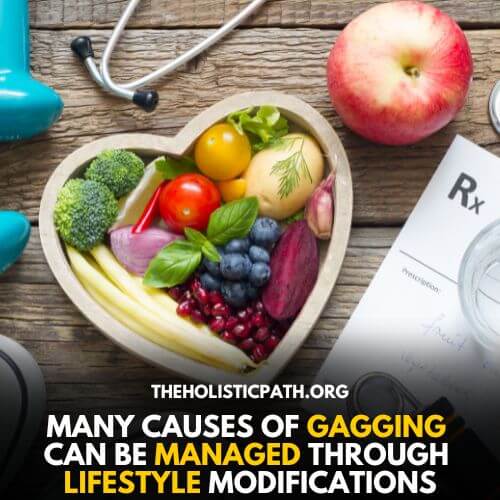Ever catch yourself wondering, ‘Why do I keep gagging?’ It’s a weird and uncomfortable thing that happens to many of us. Well, here’s a twist you might not have considered: could it be linked to anxiety?
Is gagging a sign of anxiety? In this article, we’re diving into this puzzling connection between our mental state and that odd sensation of gagging. Let’s explore together and figure out if there’s more to this than meets the eye—because understanding this could give us some pretty cool insights into our overall health!
What Exactly Is Gagging?
Gagging is a reflex reaction the body uses to expel unwanted substances or objects from the mouth. It involves an intense convulsion of the muscles in the throat and stomach, causing us to involuntarily vomit. It’s characterized by a sudden urge that can’t be controlled, making it uncomfortable and often alarming.

It could also be described as a dry heave – when we force ourselves to vomit without any substance coming up. This is usually caused by gagging without producing a real gag reflex.
These involuntary actions are our body’s way of trying to protect itself from harm, alerting us that something isn’t right with our environment or situation. Gagging can be triggered by various elements, such as bad smells, certain foods, or even certain emotions.
Is Gagging A Sign Of Anxiety
Gagging can indeed be a sign of anxiety, and understanding the relationship between the two requires examining both the psychological and physiological aspects involved. Anxiety, a common mental health condition, can manifest in various physical symptoms, and gagging is one such manifestation. Here’s a detailed breakdown:
Physiological Aspect:
Factors Influencing Gagging in Anxiety:
Several factors contribute to the manifestation of gagging in individuals with anxiety. These include:
| Factors | Explanation |
|---|---|
| Increased Stress Hormones | Anxiety activates the release of stress hormones like cortisol, which can affect various bodily functions, including the sensitivity of the gag reflex. Elevated stress levels may heighten the likelihood of gagging even in non-threatening situations. |
| Muscle Tension | Anxiety often leads to muscle tension, particularly in the throat and neck areas. This tension can contribute to a hypersensitive gag reflex, making individuals more prone to gagging even in response to mild stimuli. |
| Psychological Triggers | Anxiety is closely tied to psychological factors, and certain situations or stressors can trigger a defensive response in the form of gagging. This may be a subconscious reaction to perceived threats or discomfort. |
| Associative Learning | Over time, individuals with anxiety may develop an association between their emotional state and the sensation of gagging. This learned response can perpetuate the connection between anxiety and the physical act of gagging. |
It’s important to note that while anxiety can contribute to gagging, other factors such as medical conditions, allergies, or gastrointestinal issues may also play a role. If persistent or severe, it’s advisable to consult with a healthcare professional for a thorough evaluation and appropriate guidance.
10 Symptoms Of Anxiety-Induced Gagging
Gagging is a common response to anxiety and stress, especially when accompanied by other physical symptoms such as nausea and dizziness. It can also be caused by underlying medical conditions, so it’s important to consult your doctor if you are experiencing frequent gagging episodes. Here are 10 common symptoms of anxiety-induced gagging:
- Excessive saliva production
- Sudden onset of gagging or dry heaving
- Choking sensation
- Painful swallowing
- Sudden urge to vomit
- Nausea and/or vomiting
- Difficulty breathing or a feeling of tightness in the throat
- Pain or discomfort in the chest area
- Increased heart rate or palpitations
- Dizziness or vertigo
- Feeling faint or lightheaded
- An intense feeling of fear or dread
- Hyperawareness of physical sensations in the body.
Gagging is a common response to anxiety and stress, so it’s important to be aware of the signs and symptoms that may accompany it.
Why Do I Keep Gagging? 7 Possible Reasons
Why Do I Keep Gagging in the Morning? 10 Possible Reasons
Gagging in the morning is a fairly common occurrence, especially when it is accompanied by feelings of anxiety or stress. Anxiety gagging in the morning is a common symptom of panic attacks and anxiety disorder.
This can be an extremely distressing experience for those affected as it can leave them feeling overwhelmed, scared, and out of control. Anxiety gagging in the morning can occur due to various physical or psychological triggers such as a sudden increase in adrenaline production, hyperventilation, or even simply lying down after being awake all night.

It may sometimes indicate a larger underlying medical condition and should not be taken lightly. Gagging in the morning may be due to a number of factors. Common triggers for gagging can include strong odors and tastes; eating too quickly; drinking carbonated beverages; smoking; and even talking loudly or singing loudly. Here are some potential causes of gagging in the morning:
- Oral Hygiene: Poor oral hygiene can lead to the accumulation of bacteria and plaque in your mouth, causing bad breath and potentially triggering a gag reflex when you wake up. Brushing your teeth and tongue thoroughly before bed and in the morning can help alleviate this.
- Postnasal Drip: Postnasal drip occurs when excess mucus from your nose and sinuses drips down the back of your throat. This can be caused by allergies, sinus infections, or other respiratory issues. The accumulation of mucus in your throat can lead to a gagging sensation.
- Acid Reflux: Gastroesophageal reflux disease (GERD) can cause stomach acid to flow back into your esophagus, especially when lying down at night. In the morning, this acid may irritate your throat and trigger a gag reflex.
- Hunger: Being hungry in the morning can sometimes cause a gagging sensation. When your stomach is empty, it can contract, and the hunger pangs may trigger a reflexive response, including gagging.
- Pregnancy: Some pregnant individuals experience morning sickness, which can lead to nausea and gagging in the morning. This is usually due to hormonal changes during pregnancy.
- Medications: Certain medications can have side effects that include nausea and an upset stomach. If you take medication in the morning, it might contribute to your gagging sensation.
- Stress and Anxiety: High levels of stress or anxiety can affect your body in various ways, including causing nausea or a heightened gag reflex. This can be more pronounced in the morning when you wake up with a racing mind or a sense of dread.
- Infections: Infections in the throat, such as strep throat or tonsillitis, can cause discomfort and may lead to gagging or a sore throat in the morning.
- Sleep-Related Issues: Conditions like sleep apnea or snoring can disrupt your sleep and lead to morning discomfort, including gagging. This may be due to changes in oxygen levels or your sleep position.
- Dehydration: If you’re not adequately hydrated, it can lead to a dry throat, making it more sensitive and prone to irritation or gagging in the morning.
It is important to consult your doctor if you experience frequent gagging episodes as it can be a sign of anxiety or underlying medical conditions such as acid reflux, GERD, post-nasal drip, sinusitis, or throat cancer.
18 Practical Tips For Dealing With Anxiety-Related Gagging
Dealing with anxiety-related gagging can be a daunting task. This embarrassing and uncomfortable symptom of anxiety can cause feelings of fear, helplessness, and frustration.
Fortunately, there are a few practical tips that you can employ to help reduce or eliminate your gagging symptoms. Here are 18 practical tips for dealing with anxiety-related gagging:
- Take slow, deep breaths when you start to feel anxious.
- Practice relaxation techniques such as yoga or meditation to help reduce stress and anxiety levels.
- Drink plenty of water throughout the day as dehydration can trigger gagging episodes.
- Avoid eating too quickly as this can cause air to be swallowed which could lead to gagging.
- Avoid drinking carbonated beverages which can exacerbate symptoms of GERD and acid reflux.
- If you are prone to morning gagging, try sleeping with your head slightly elevated using extra pillows so that stomach acid does not travel up the esophagus while lying down after eating a meal late at night or in the early morning hours.
- Avoid smoking or using any other form of tobacco as this can irritate the throat and cause gagging.
- Use a humidifier to keep your sinuses healthy and to reduce post-nasal drip.
- Identify what triggers your anxiety and work on addressing them through therapy, lifestyle changes, medications, etc.
- Talk to your doctor about possible treatments for underlying medical conditions such as acid reflux or GERD that could be causing morning gagging episodes.
- Keep a food journal in order to identify any potential foods that may trigger your symptoms and avoid eating those foods whenever possible.
- Open windows or turn on an air purifier if strong odors are causing gagging.
- Ask your doctor about medications or natural supplements that can help reduce anxiety and stress levels.
- Seek professional help from a therapist if you are suffering from an anxiety disorder as they can provide guidance on managing anxiety more effectively.
- Make sure to get plenty of restful sleep each night in order to reduce stress levels which could be contributing to morning gagging episodes.
- Consume smaller meals throughout the day rather than one large meal as this can reduce the chances of morning gagging.
- Avoid foods and drinks that trigger your gag reflexes such as strong odors, spicy or acidic foods, and carbonated beverages.
- Identify any underlying causes of anxiety or stress in your life and work on reducing them to lessen the chance of experiencing panic attacks which could lead to morning gagging.
8 Medical Treatments for Gagging
While many causes of gagging can be managed through lifestyle modifications such as avoiding triggers like strong odors and eating more slowly, it may be necessary to seek help from a doctor or therapist if the gagging is due to an underlying medical condition or psychological disorder. Here are some potential treatments for gagging:
- Antidepressant medications – If your gagging is caused by anxiety, depression, or panic attacks, your doctor may recommend antidepressant medication such as selective serotonin reuptake inhibitors (SSRIs) to help manage your symptoms.
- Allergy medications – If your gagging is caused by allergies, antihistamines can help reduce inflammation in the nasal passages, throat, and lungs which can prevent gagging episodes.
- Acid reflux medications – Acid reflux and GERD can be treated with proton-pump inhibitors (PPIs) to reduce the amount of acid produced in the stomach.
- Throat cancer treatments – Treatment for throat cancer may include surgery, radiation therapy, and chemotherapy depending on the type and stage of cancer.
- Sinusitis medications – Antibiotics can be prescribed to treat sinus infections which can help reduce morning gagging episodes.
- Post-nasal drip medications – Decongestants and antihistamines can help reduce inflammation in the nasal passages that cause post-nasal drip which is a common cause of morning gagging.
- Cognitive Behavioral Therapy (CBT) – CBT can be used to identify unhealthy thought patterns and behaviors that can lead to gagging and teach you more effective ways of coping with stress.
- Herbal remedies – There are a variety of herbal supplements available that may help reduce inflammation in the throat and airways which could help reduce gagging episodes.
It is important to discuss any potential treatments with your doctor before starting them as some medications or therapies may not be suitable for everyone. Additionally, it is important to identify any underlying causes of the gagging in order to manage it effectively.
Your doctor will likely conduct tests such as blood work, imaging studies, and/or endoscopy in order to diagnose the cause and recommend the appropriate treatment. If lifestyle modifications do not seem to be helping, then medical intervention may be necessary. With the right treatment plan, gagging can often be managed and controlled.
References
Debs, N. N., & Aboujaoude, S. (2017). Effectiveness of intellectual distraction on gagging and anxiety management in children: A prospective clinical study. Journal of International Society of Preventive and Community Dentistry, 7(6), 315. https://doi.org/10.4103/jispcd.jispcd_397_17
Krol, A. J. (1963). A new approach to the gagging problem. Journal of Prosthetic Dentistry, 13(4), 611–616. https://doi.org/10.1016/0022-3913(63)90131-8

